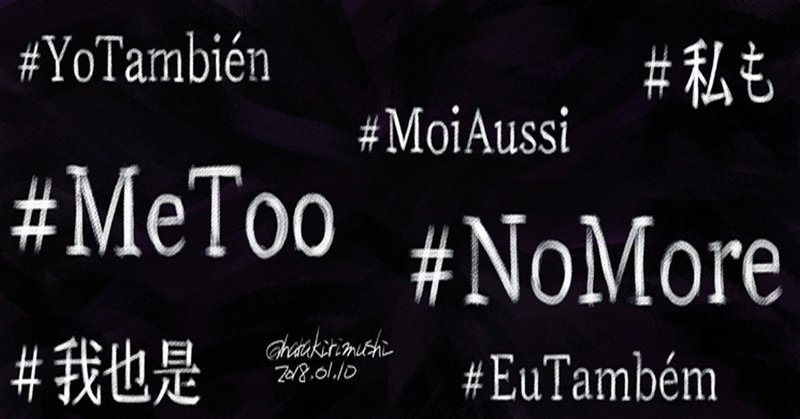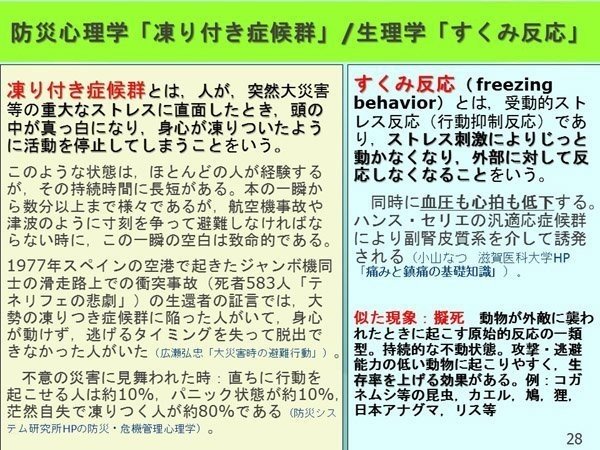
【英日対訳】米臨床心理士が語る「レイプの被害者が抵抗したり叫んだりできない理由」|ワシントンポスト (2018.5.28著者改訂版) #MeToo
Twitterモーメント版(※ドラフト版)
はじめに
ジェームス・W・ホッパー博士(James W. Hopper PhD) は、フリーのコンサルタントでハーバード大学医学大学院(HMS)の精神科で心理学の非常勤講師を勤める。トラウマの神経生物学に関する研究を行い、捜査員、検察官、裁判官及び高等教育機関の専門職に対し、トラウマの神経生物学を教える。
本稿で博士は、攻撃(=性的暴行)を受けた人びとが必ずしも、第三者が予想するような反応を示さないことの理由を説明する。もともと、2015年6月23日付け米紙「ワシントンポストに掲載された記事を著者自身が改訂した。著者本人にテキストをいただき、和訳したものと差し替えたのが本稿である。(2018.5.28)
※訳注:この記事でホッパー博士は、これまで"fear circuitry”(恐怖回路)としていたものを、"defense circuitry"(防御回路)と言い換えている。掲載当時(2015年)からの研究の進歩により、扁桃体(amygadala)が「恐怖」ではなく「防御」を司る機能だと判明したからだという。つまり、記憶が曖昧になったり消失したりすることは、「恐怖」による脳機能の障害ではなく「脅威」に対する脳の自然な「防御反応」だと。博士本人からその旨の説明を受け、新たな原稿(公開中)をいただいたのであらためて訳出する。
本編
Why many rape victims don’t fight or yell
レイプの被害者が抵抗したり叫んだりできない理由
By James W. Hopper June 23, 2015
ジェームス・W・ホッパー博士(臨床心理士)
2015年6月23日
[参考]大阪高等検察庁・田中嘉寿子検事 による講演「性犯罪被害者の心理」

[リード文] 性暴力を受けている間、人間の脳内は防御回路(defense circuitry)によって支配される。前頭前野皮質の機能は著しく阻害され、唯一残るのは反射(reflexes)と習性(habits)となる。
[Lead Text] In the midst of sexual assault, the brain’s defense circuitry dominates. The prefrontal cortex can be severely impaired, and all that’s left may be reflexes and habits.
これまで多くのレイプ被害者が、暴行されている間どう反応したか、或いは”どう反応しなかった”かについて語ってきた。『Harvard Review of Psychiatry』に掲載された記事によれば、いくつかの基本的な反応は進化により人間の脳に組み込まれている。
Many victims of rape have described how they reacted - and did not react - while being assaulted. An article in the Harvard Review of Psychiatry shows that some basic responses have been programmed into human brains by evolution.
被害者たちの証言をトラウマの神経生物学と融合することにより、被害者の治癒を促進し、責任と正義を追求するうえで本質的な役割が果たされる。
Bringing together the accounts of those who have been assaulted with the neurobiology of trauma can play an essential role in supporting healing and the pursuits of accountability and justice.
たとえば、「すくみ/凍り付き」(freezing)は、危険、特に捕食者(predator)による攻撃を察知したときの脳からの指示による反応である。車のヘッドライトに照らされた鹿を考えてみるとよい。
For example, freezing is a brain-based response to detecting danger, especially a predator’s attack. Think deer in the headlights.
ある女性は、「私はNOと言わなかったけれど、何をしたらよいか本当にわからなかった。身体がただすくんでしまう [=凍り付いてしまう] 状態だった(I just kind of froze)」と語っている。
As one woman said, “I didn’t say no, but I didn’t really know what to do. I just kind of froze.”
「すくみ/凍り付き」は、防御回路の中の重要な構造体である扁桃体(amygadala)が攻撃を察知し、脳幹(brainstem)に動作を抑制する指示を出すことにより起こる。この反応は、瞬時に、かつ意識的な制御を離れて、自動的に起こる。
Freezing occurs when the amygdala - a crucial structure in the brain’s defense circuitry - detects an attack and signals the brainstem to inhibit movement. It happens in a flash, automatically and beyond conscious control.
これは、発生した攻撃に対し、生物を迅速に警戒態勢に転じさせ逃げ道を探ろうとする脳の反応である。目が大きく開かれ、瞳孔が拡がる。聴覚が敏感になり、身体は闘争(Fight)するか逃避(Flight)するかの臨戦態勢をとる。しかし、これから見ていくように、必ずしもその後に闘争や逃避が起こるわけではない。
It’s a brain response that rapidly shifts the organism into a state of vigilance for incoming attacks and avenues of escape. Eyes widen, pupils dilate. Hearing becomes more acute. The body is primed for fight or flight. But as we shall see, neither fight nor flight necessarily follows.
「すくみ/凍り付き」の反応が起きると同時に、われわれの防御回路は大量のストレス性物質(stress chemicals)を前頭前野皮質に放出する。これは、我々が”理性的”に考えられるようにする部分。たとえば寝室のドアが開いていることや、寮の隣の部屋に人がいることを思い出して、それらの情報を”利用することができるよう”にする領域である。しかしこの物質の増加によって、前頭前野の機能が急速に損なわれる。なぜなら、我々は現在は地球上で支配的な立場にいるものの、進化の過程では「獲物」(prey)であり、ライオンやトラが襲ってきたとき、考えるために立ち止まることは致命的だったからだ。
Simultaneously with the freeze response, the defense circuitry unleashes a surge of “stress chemicals” into the prefrontal cortex, the brain region that allows us to think rationally - to recall the bedroom door is open, or that people are in the dorm room next door, for example, and to make use of that information. But the surge of chemicals rapidly impairs the prefrontal cortex. That’s because, despite our dominant role on the planet now, we evolved as prey, and when a lion or tiger is upon us, stopping to think is fatal.
実際、強烈なストレスや恐怖が、前頭前野皮質と理性的に考える能力を損なうことを一番承知しているのは、軍隊である。
Indeed, no one understands better than the military that intense stress and fear impair our prefrontal cortex and capacity for reason.
銃弾が飛び交い、血が流される場面においては、頼れる効果的な習性(habit)を体得している必要がある。だから、戦闘訓練は、厳格、且つ、”反復して”行われ、たとえば銃を効果的に発砲したり、戦闘陣形をとるという習性を、身体に染みこませるのである。
When bullets are flying and blood is flowing, you had better have some really effective habit learning to rely upon. That’s why combat training is rigorous and repetitive - to burn in habits of effectively firing weapons, executing combat formations, etc.
しかし、性暴力を受けたときに、頼れる効果的な習性を身に付けていなかったら、どうなるのだろうか。
But what if you’re being sexually assaulted and there’s no effective habit learning to fall back on?
もし、あなたが女性で、脳が覚えている唯一の習性が、嫌いな相手からアプローチされたときに受け流すための習慣、たとえば「もう家に帰らなきゃ」とか「あなたの彼女に見つかるんじゃない?」というセリフだったら、どうなるだろうか。あなたは、襲われるまさにその瞬間まで、これらのセリフと、それに沿うような受身の仕草だけしかできないかもしれない。
What if you’re a woman and the only habits your brain cues up are those you’ve always relied upon to ward off unwanted sexual advances - like saying, “I have to go home now” or “Your girlfriend will find out”? Those phrases, and passive behaviors that go with them, may be your only responses, until it’s too late.
数え切れないほどの被害者が、まさにこういう反応をしたと証言している。警察官や大学の職員、友人や家族までもが、「なぜ部屋から急いで出なかったのか」とか「なぜ叫ばなかったのか」などと考えたり、口に出したりすることは往々にしてある。
Countless victims of sexual assault describe just such responses. Too often police officers, prosecutors, college administrators, even friends and family think to themselves—and say out loud—“Why didn’t you run out of the room?” “Why didn’t you scream?”
前頭前野皮質が常に合理的に機能していると考える人にとって、受動的な反応は不可解である。だが、それは当時のことを振り返る被害者にとっても同じだ。すべきであった反応とは、真逆の反応をしたように思えるからだ。
But those who assume a functional prefrontal cortex - including many victims as they look back on what happened - passive habit responses can be baffling. They seem exactly the opposite of how they surely would - or should - have responded.
しかし、防御回路に支配され、前頭前野皮質が損なわれているとき、習性や反射以外には、何もできなくなることがある。
But when the defense circuitry takes over and the prefrontal cortex is impaired, habits and reflexes may be all we’ve got.
そして、防御回路が、逃走は不可能または抵抗は不毛だと認識した場合、抵抗や逃走は起こらず、極端な生存反射(科学者の間で言われる「動物的防御反応」(animal defense responses))が支配的になる。これらの反応は、身体が捕食者の手中にあり、レイプ被害者の半数が報告するように、死または深刻な怪我をすることが懸念されるときに、自動的に起きる。
And if the defense circuitry perceives escape as impossible and resistance as futile, then not fight or flight, but extreme survival reflexes (which scientists call “animal defense responses”) will take over. These can activate automatically when the body is in a predator’s grip--and when, as half of rape victims report, we fear death or serious injury.
その反応の1つが、緊張性不動(tonic immobility)である。「すくみ/凍り付き」反応が起きると、身体と脳は行動を起こす態勢をとる。だが緊張性不動では、身体は文字通り、恐怖で麻痺し、動くことも、話すことも、叫ぶこともできなくなる。肉体は硬直し、手は感覚を持たなくなることがある。
One such response is tonic immobility. In freezing, brain and body are primed for action. But in tonic immobility, the body is literally paralyzed by fear - unable to move, speak, or cry out. The body goes rigid. Hands may go numb.
もう1つは、虚脱性不動(Collapsed immobility)である。血圧と心拍数が急激に減り、脳が酸欠状態となる。人によっては、朦朧としたり、場合によっては、意識を失うことがある。
Collapsed immobility is another. Heart rate and blood pressure suddenly drop, and the brain is deprived of oxygen. People feel faint and may even pass out.
それがどんな様子かは(またこのこ難しい話題に一区切りのユーモアを入れるために)、"passes out on Slingshot ride"で検索すると出てくる一連のYouTubeの動画を観てみればわかってもらえるだろう。
To see what this looks like (and get a humorous break from this difficult topic), you can watch the YouTube videos that come up for “passes out on Slingshot ride”.
加害者が欲望を満たした後、「着ぐるみ人形」になったような感覚だったと説明する人もいる。この感覚を「眠たかった」と表現する人もいる。
Some describe feeling “like a rag doll” as the perpetrator did whatever he wanted. Others describe feeling “sleepy”.
警察署から裁判所に至るまで、被害者に対する不信感を持たれることが往々にしてある。「眠たかったなら、レイプじゃなかったのでは?」と。
Too often, from precinct stations to courtrooms, victims are met with disbelief: How could it be rape if you were sleepy?!
もう一つのよくみられる反射反応に解離(dissociation)がある。自分の親密な部分を侵されたことに対する恐ろしい感情と感覚から解離するような、ぼんやりした、現実離れした感覚だ。まるで夢の中の出来事のように。
あるいは、天井や路上の音に意識が集中したりすることもある。
Another, more common reflexive response is dissociation: disconnecting from the horrible emotions and sensations of such an intimate violation. Spacing out and feeling unreal, like in a dream. Or attention may narrow to a spot on the ceiling or sounds of the street below.
薬物やアルコールで意識を失わせないかぎり、脳の防御回路はいずれ攻撃を察知し、制御を奪う。
Unless someone is drugged or intoxicated into unconsciousness, eventually the brain’s defense circuitry will detect the attack and take over.
ほとんどの被害者は、少しの間であっても「すくむ/凍り付く」。
効果的に反撃する人もいれば、いつもの習性で消極的に拒絶する人もいる。諦めて泣き出す人もいる。麻痺したり、ほんやりしたり、意識を失ったり、解離したりする人もいる。
Most victims will freeze, if only briefly. Some will fight back, effectively. Some will resist in habitual passive ways. Some will suddenly give in and cry. Others will become paralyzed, become faint, pass out or dissociate.
こうした反応を経験したことのある人のほとんどが、これらが攻撃や恐怖に対する脳の反応であることに気づかない。
Few who’ve experienced these responses realize that they are brain reactions to attack and terror.
被害者たちは、「抵抗できなかったこと」で自分を責め、恥だと感じる(特に男性の被害者は自分たちを臆病者だとみなし、男らしくないと感じる)。
They blame themselves for “failing” to resist. They feel ashamed. (Men especially may see themselves as cowards and feel like they’re not real men.)
捜査中であっても、彼らはそのことを誰にも言わないかもしれない。悲しいことに、多くの警察官や検事は未だに、これらの脳からの指示に基づく反応について全く知らされていないか、十分知らされていない。
They may tell no one about these responses, even during an investigation. Sadly, many investigators and prosecutors still don’t know about all or some of these brain-based responses.
これらの反応はいずれも、男女ともに、同意があったとか、臆病であったことを示唆するものではない。
None of these responses - in women or men - entail consent or cowardice.
いずれも、尊重や共感に値しない抵抗であったことの根拠にはならない。
None are evidence of resistance too insufficient to warrant our respect and compassion.
これらは、(断片的で不完全な記憶を予期すべきであるように)脳が防御回路に支配されたときに起こる、「予期される反応」なのである。
They are responses we should expect from brains dominated by the defense circuitry (just as we should expect fragmented and incomplete memories).
最後に、こうした反応は”どの文化圏においても”見られることだ。それはわれわれ人間が文化を学び、己の文化的価値観で、性的暴行を受ける男や女はそれぞれこう反応し、その後ではこう覚えている「はずだ」と、人間を誤解したり、誤って判断し始めるはるか以前に、進化を通じて我々人間の遺伝子や脳に刻みこまれてきたものだからだ。
Finally, they are responses we should expect in every culture. Evolution programmed these responses into our brains long before we were sophisticated enough to create cultures, or confused enough to misjudge victims with culture-based expectations of how women and men “should” respond while being sexually assaulted.
誰にも起こりえることで、そのことはいまは知り得なくても、いつの日か、誰かが性暴力の被害者となった時、誰もが、このような攻撃に対する脳の基本的な反応を理解し、その知識を、被害者の治癒と正義の推進に役立てる日が来ることを私は願う。
May the day come when everyone who knows someone who has been sexually assaulted - which is all of us, whether we know that yet or not - understands these basic ways that our brains can react to such attacks and uses this knowledge to foster healing and justice.
参考資料
被害者が凍り付く瞬間~あるBBCドラマより~
ホッパー博士のその他の著作
「米臨床心理士ホッパー博士が説明する」シリーズ(Tumblr)
noteをご覧くださりありがとうございます。基本的に「戦う」ためのnoteですが、私にとって何よりも大切な「戦い」は私たち夫婦のガンとの戦いです。皆さまのサポートが私たちの支えとなります。よろしくお願いいたします。
